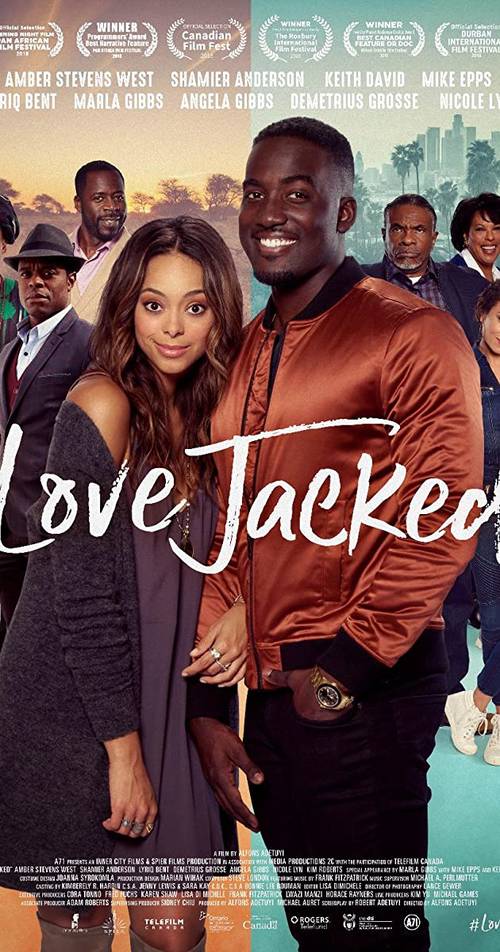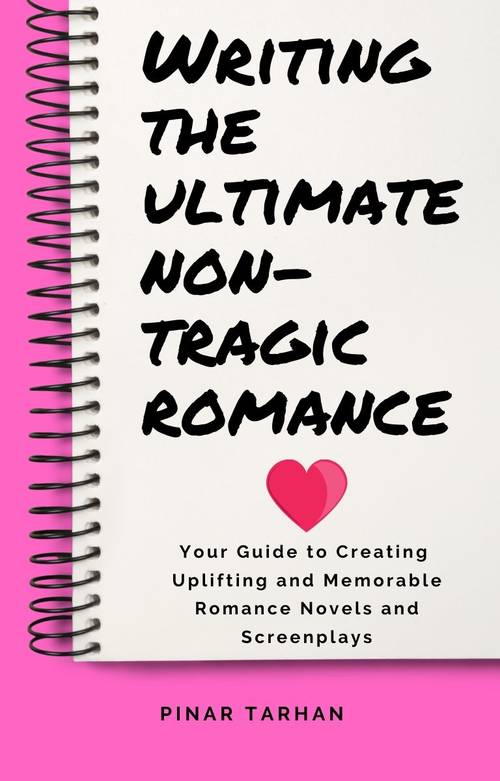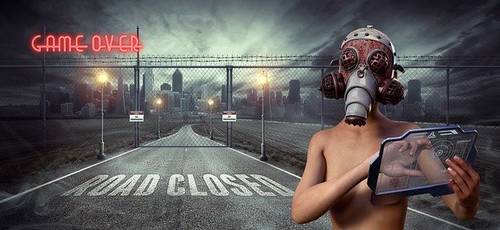This post contains affiliate links. Purchasing through them doesn’t cost you extra, but it does help me keep the blog running (and with more frequent content).
There are many fun and romantic romance tropes.
However, there are also some very unromantic ones. So much so that it makes you wonder what they are doing in romance films, series, or novels.
In this article, I cover some of the worst offenders, why they don’t work, and when they might.
But I believe it is up to the author to use or ditch any trope. This is one romance author’s opinion on what doesn’t work.
I should, however, point out that I’m not the only author/reader/viewer I know who’s bored and frustrated with these tropes.
A little about me:
Why am I talking about romantic tropes?
I’m a romantic.
Hopeless? Depends on who you ask.
But just take a look at some of my favorite films (Braveheart, Pride and Prejudice, Dirty Dancing, The Crow, Strange Days, A Royal Affair), and you will see there are strong and memorable romantic storylines even if the movie isn’t primarily romance.
I’m also the author of two romcom novels and two guides on how to write great romance.
What’s excluded and why
When it comes to listing unromantic tropes, I’m going to leave out the very obviously bad (and criminal) stuff like stalking and abuse. Those things don’t belong in romance, and unless you want to write horror, I suggest staying far from them.
But just because an action is legal, it doesn’t mean it doesn’t make the audience’s blood boil or leave a bad taste in their mouths.
I’m also leaving supernatural romances out because we tend to stretch our values and morals when it comes to other creatures.
We need to, otherwise, we’d never be rooting for Stefan to be happy in The Vampire Diaries or Angel to stay with Buffy.
I’ll be covering movies and series as opposed to novels since they are easier to check out than books. Clips are mostly available on YouTube and/or the film is on your streaming service. What I say applies whether you write novels or screenplays.
And remember, when I’m criticizing a movie or series for using a trope, I’m not saying that film or series is bad. It is just not romantic, and it makes it harder (if not impossible) to cheer for the protagonist(s) performing the act.
Why You Need to Pick Your Romance Tropes Carefully
When we read or watch romance, ideally, we should want to live in that world and be one of the characters.
If your reader or watcher is repeatedly saying “Yikes, I’d never date this person,” or “I’m so glad I didn’t go through this,” something has gone wrong in our choice of tropes and situations.
To make my point, I’ll be spoiling the following series and films to various degrees:
– Grey’s Anatomy
– The Wedding Planner
– The Wedding Singer
– Outlander (the series)
– Revenge (The Kevin Costner/Madeline Stowe movie)
– The English Patient
– Rumor has it (the sort of The Graduate sequel)
– The Graduate
– Addicted to Love (Meg Ryan/Matthew Broderick movie)
– Timeline
– Tristan and Isolde
– In a Savage Land
– After
– While You Were Sleeping
– Strange Days
– Autumn in New York
Note: This is a long, comprehensive article. If you’d like a pdf version, wait until the end. You can enter your email address and get it for free.
Ready? Let’s roll:
Unromantic Romance Trope 1: Leaving someone at the altar/leaving your wedding with someone else/interrupting a wedding
This is one of my biggest pet peeves. Why someone ever considered this was romantic, I’ll never know.
Of course, exceptions apply. If the person getting married was/is being forced and saving them is only possible by preventing a wedding, then by all means.
But when free and safe grown-ups do this, it makes them look selfish, weak, immature, and heartless.
If you’re going to use this trope, you better make sure we have a reason to condone the act. Hating the bride/groom might be a start. But it is usually not enough. Because if they are such jerks, why did our protagonist agree to this?
– Grey’s Anatomy
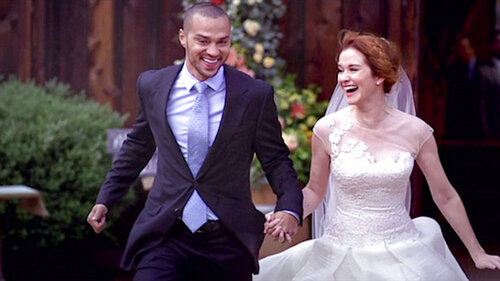
Grey’s Anatomy might be the romance equivalent of Game of Thrones when it comes to killing off beloved characters, hence making my viewing sporadic.
I was pissed when they killed Denny (Jeffrey Dean Morgan). I put myself through a similar disappointment when they killed off Henry (Scott Foley).
Not to mention I also had to say goodbye to Mark, Lexie, and Derek.
I did lose interest in their relationship the moment Jackson (Jesse Williams) and April (Sarah Drew) ran off from her wedding to Matthew.
Poor, sweet Matthew. His only fault was not being Jackson.
To the writers’ credit, April wasn’t depicted as the most rational character. She was always prone to rash decisions and then regretting them.
But I expect a smart doctor and a nice person to figure out who she loves enough to marry before the wedding. I am definitely not a fan of her running off with one of the wedding guests. I’m also not fond of the wedding guest (Jackson) for not making his grand speech earlier.
– The Wedding Planner
In the film, Matthew McConaughey’s character Steve is engaged, but he falls for a woman he meets by chance (Jennifer Lopez’s Mary). And imagine both their shock when they find out she is his wedding planner.
There are the usual romcom high jinks, and toward the end of the film, Steve realizes his fiancée aren’t right for each other anymore.
To his credit, he has a heart-to-heart with her, and she also changes her mind. So, no victims.
Meanwhile, Mary’s marrying a guy she was avoiding during the film.
What’s funny, is that it’s not Mary who objects to getting married right at the altar. It’s her father, and then his friends. Mary still seems likely to go through with it.
But the next scene cuts to Steve determined to stop the wedding when he sees everyone but Mary outside City Hall. Apparently, the guy stopped it because he knew he wasn’t the one.
So, it all works out.
But…
Three intelligent grown-ups (Mary, Steve, Steve’s fiancée) not registering their feelings up until the last minute doesn’t sit right.
Stopping a wedding wasn’t the only unromantic trope either in this film either. Steve was getting his flirt on with a woman he just met even though he was engaged.
Steve and Mary get their happily ever after, and we let them get away with all their crazy because they are so charming. But The Wedding Planner never makes the list of my favorite romcoms.
Ditching At The Altar Trope Done Right:
Want to watch a ditching someone at the altar trope done right? Watch The Wedding Singer starring Adam Sandler and Drew Barrymore.
The person ditching at the altar is the villain of the story, and not our protagonist. Robbie’s (Adam Sandler) girlfriend ditches him and scars him. But then Robbie falls in love with a great woman (Julia, played by Drew Barrymore) who is nothing like his evil ex.
My favorite line from the movie is below. The film is set in the 80s, and the woman is wearing a Van Halen T-shirt.
“Please get out of my Van Halen T-shirt before you jinx the band and they break up!”
(Not a romantic trope. I just really like Van Halen.)
– While You Were Sleeping
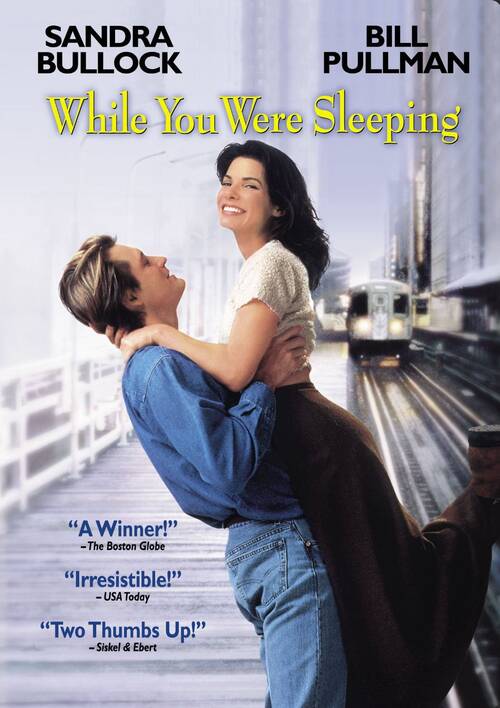
This is one of my favorite romcoms of all time. And the protagonist does ditch someone at the altar. But we forgive her for it because we never really liked the guy, and she had understandable (albeit a little crazy) reasons for lettings things get there.
In the film, Sandra Bullock plays Lucy, a transit token collector who is in love with a commuter she never met (Peter, played by Peter Callagher).
Having lost her father at a young age, she is all alone and yearns for a family.
When Lucy saves Peter’s life after an accident and goes to the hospital, the staff mistakes her for his fiancée. Peter is unconscious, and knowing this is the only way she will get to see him, she keeps up the ruse.
Then his family shows up. When they are delighted to meet Lucy, she can’t bring herself to admit the truth. The family is ecstatic Peter is with someone sweet and caring. So, Lucy has a family now, at least until Peter wakes up. The only problem is Peter’s brother Jack (Bill Pullman), who’s immediately suspicious of her.
But it’s Christmas, the family loves Lucy, and she ends up spending a lot of time with Jack.
They fall in love as they get to know each other. But then Peter wakes up, decides he’s engaged to Lucy after all – after hearing her praises from everyone.
Certain obstacles prevent Lucy from admitting the truth before, but finally, she confesses everything at the altar.
And we forgive her for it because she is apologizing and admitting her love for the entire family – not just to Jack.
Moreover, Peter’s revealed to be shallow and insensitive once again when his actual, already married fiancée and her husband show up.
It is a cute scene with no damage done.
And it’s impossible not to forgive Lucy because having no family is tough. And the film is a lovely depiction of how we develop crushes (usually through shallow means) versus how we fall in love (after getting to know somebody).
After everything she pulled, Lucy was still more likable than Peter.
Unromantic Romance Trope 2: Cheating
We have a worse trope than ditching someone at the altar, and it’s cheating.
It’s worse when the protagonist is cheating on their supposed true love.
– Rumor has it
This is a sort of sequel to The Graduate (which is incidentally famous for its ditching at the altar ending).
Sarah (Jennifer Aniston) finds out her family might be the inspiration for the book, and she might be the child of the first affair story depicted there. (Mrs. Robinson, anyone?)
So, she searches for Beau (Kevin Costner).
I love the concept so far. And the cast is just wonderful: Aniston and Costner are joined by Mark Ruffalo, Mena Suvari and Shirley MacLaine.
The problem is, Sarah is so unlikable and unrelatable. And somewhere in the story, she sleeps with Beau, actively cheating on the guy she is serious with (Mark Ruffalo).
Look, I’m not immune to Kevin Costner’s charms, no matter how old he is. I grew up in the 80s and 90s watching him. #myRobinHood.
The issue here? Her boyfriend (Ruffalo) was super nice. Charming. And her only problem was that she didn’t know what she wanted.
After all that was said and done, if she realized neither guy was for her, I’d have embraced the cheating trope, albeit with some cringe. (There is also the cringe factor that Kevin’s character could have been her biological father, but I digress.)
But what happens in the film?
She realizes she has wanted Ruffalo all along and begs him to take her back…and he does!
Like, why?
The film, if you consider it to be a weird comedy, is fine and interesting enough. Just don’t watch it expecting a satisfying romantic comedy.
– Autumn in New York
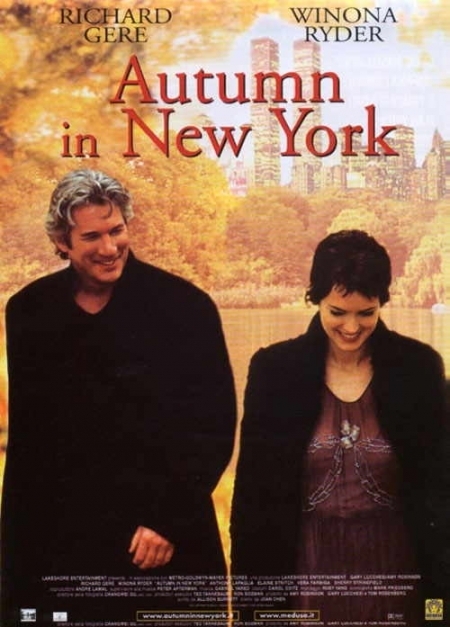
A guy dating someone 20-30 years his junior isn’t off to a best first impression. For us to be sold, he needs to do more than look good and connect with his love interest. He needs to show us he’s worth it.
Because it’s risky, isn’t it?
It might work, but they are unlikely to be in similar places in their lives. But if their bond is strong enough, this might very well be a great romantic story.
And who better to cast as an older lover than the ever-charming Richard Gere? He has successfully played handsome leads across genres for decades.
This character, however, is a douche.
What does he do? Romances a woman half his age, cheats on her when she is sick (and at the party where she is also a guest, no less), only confesses after she insists, and then leaves because…it was not a good idea for them together in the first place?
Why did he do it? Because he was scared.
Oh, please. This guy is my least favorite Gere character ever.
I also don’t like the terminally sick protagonist trope either, which, for some reason, generally tends to be female.
She takes him back, unfortunately.
I didn’t wish this couple a happy ending. I wanted her to find someone else.
Cheating Trope Done Right:
It’s fine if your protagonist is cheated on and then they leave the cheater for a better start.
Cheating in romance also works when cheaters are the victims in one way or the other – which happens when the party being cheated on is evil or does something horrific to lose our sympathy.
– Revenge
Take Revenge.
In Revenge, the romantic situation of the female protagonist (Madeleine Stowe) is the opposite of the Rumor Has It character.
Her husband (Anthony Quinn) is a mobster! He has been cheating on her, and being a mobster, you can imagine he is not a good guy. He’s also way too old for her.
Enter an old war buddy of his. Except this war buddy is about her age. He is gorgeous, played by young Kevin Costner. He’s nice and exciting. OK, he falls for a friend’s wife and has an affair, but not being a mobster, he is still pretty decent by comparison.
They fall in love. You root for them, even though you know they are doomed.
– The English Patient
I love this movie. It simultaneously made me a fan of actors Ralph Fiennes, Kristin Scott Thomas, Juliette Binoche, Willem Dafoe, and writer/director Anthony Minghella.
It’s a visual feast.
And going in, you know you’re going to see something tragic because it’s the story of a severe burn victim telling his love story to a nurse, and the background is Word War II.
But the romance? The romance up until the end is not one that I liked or approved.
A married woman (Scott Thomas) falls under the charm of a guy (Fiennes). And her husband is her childhood friend who she has been with together for a long time.
Yikes.
We can’t even complain he is old or bad-looking. He’s played by Colin Firth, for crying out loud! (Not that it’d justify it, but we were grasping for straws here). And there is nothing seemingly bad or wrong with him either.
The guy she falls for? Yes, he is sexy and a bit mysterious. But he is also obsessive, and if it wasn’t for Ralph Fiennes giving a hypnotizing performance (he was nominated for Oscar), I’d have been repulsed by his actions altogether. Not a fan of the wife, either.
It seems more like good sex, and there’s nothing romantic about that when two people are cheating.
But then something happens in the film, and suddenly, I’m declaring this an epic love story and crying. What the hell?
Well, the husband tries to commit double murder/suicide, succeeding in killing himself and severely wounding his wife. She then declares her love, and the lover risks his life and betrays his country to save her.
Not the romantic story I’d write, but I ended up rooting for two characters I didn’t like at all.
But this is a romantic war drama movie. It’s harder to pull such stunts in a romcom.
If you are going to make your protagonist a cheater, you’ll risk losing/disappointing readers.
– Unfaithful
Unfaithful is not a romantic movie. At all.
It’s classified as one (in addition to drama and thriller) because the female protagonist (Diane Lane) cheats on her husband (the male protagonist) by having a steamy affair with a stranger (Oliver Martinez).
But then her husband (Richard Gere) finds out. He chooses to confront the guy, kills him by accident, and in the end, they can’t decide whether to flee or let him go to prison.
It works because it’s unsettling, and it was the goal.
You don’t want to be her. Or the lover. Or the husband.
Without the drama and the thriller elements, the movie would fail. (Also, obviously, props to casting, directing, and acting.)
Is it still memorable after I saw it at the theatres in 2002?
Yes.
Do I still hate the wife and the lover characters after all these years? Also, yes.
If you wanted me to recommend an uncomfortable drama about an affair, I’d recommend this. If you wanted me to recommend a romance, this film wouldn’t cross my mind.
It’s good. It’s just not romantic at all.
Unromantic Romance Trope 3: Not taking no for an answer/constant denial
You know how it goes. One side doesn’t feel the same way, so they keep saying no.
The other party keeps pursuing. And there starts an unhealthy, unromantic relationship.
Or sometimes, one party doesn’t reciprocate. They say and show this repeatedly. But our protagonist refuses to listen.
– 500 Days of Summer

500 Days of Summer, anyone?
For Summer, it was a fun fling.
For him, it was everything.
Summer (Zooey Deschanel) was always honest about what it was. But hey, it didn’t serve his interests (Joseph Gordon-Levitt), so he avoided facing this.
500 Days of Summer is a very good, enjoyable film – as long as you treat it as a what-not-to-do guide for relationships.
As a romance? No, thank you.
I prefer my romances mutual, and I prefer protagonists who understand what no means. (And Gordon-Levitt is with me on this interpretation, if you were wondering.)
Unromantic Romance Trope 4: Obsession with an ex/using another person to make your ex jealous and then falling in love with the new person
– Forgetting Sarah Marshall
I really like this movie. It’s hilarious. I think it was always aiming to be funnier than it is romantic, and despite being uncomfortable in a lot of places, it’s highly entertaining.
But when it comes to the romance, it really isn’t how most people would want to meet their loved ones.
Peter (Jason Segel) is devastated after being dumped by his long-time actress girlfriend (Kristen Bell), and he goes on a Hawaiian vacation to get over her. But this dude even picked this place because she talked about it, and of course, he runs into her and the guy she dumped him for, an over-the-top British singer (Russel Brand).
He ends up staying at the hotel, in the room right next to theirs and developing a friendship with the beautiful receptionist Rachel (Mila Kunis).
So far so good.
Could it happen to you or me? Maybe.
But I should hope that we would be more rational and choose a destination spot that wouldn’t remind us of the person that hurt us, or even get depressed/obsessed over a person who wasn’t happy with us. Or, you know, we wouldn’t spend so much time with them on our vacation, which we took to get over them in the first place.
He goes on to try to make Sarah jealous, Sarah does the same and…You get the picture.
Do we still kind of like Peter and want him to be happy in the end? Yeah.
Do we fantasize about a guy like Peter? No.
– Addicted to Love
Forgetting Sarah Marshall pales in comparison to what our protagonists get up to in Addicted to Love.
Maggie (Meg Ryan) wants revenge from her ex.
Sam (Matthew Broderick) wants his ex back.
Sam and Maggie’s exes are together, so Sam and Maggie team up. They move to an apartment in the building across from the lovers and strategize to break them up. (And the stuff they do… I’m sure it’s not legal for the most part.)
And as you might guess, they fall in love and stay together in the end.
Just think about the spying that went on.
Yikes.
A very healthy relationship between two healthy people. Not!
Again, the movie is fun.
But just imagine how creepy the situation is.
*
In all honesty, there is not much you can do with this trope that will make your protagonist(t) look good, except….
Obsession Over An Ex Trope Done Right:
– Strange Days
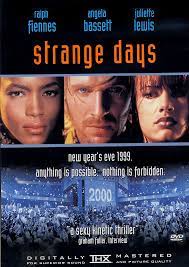
Strange Days is a brilliant action, crime, drama with a sci-fi element. It’s one of my all-time favorite films, and even at 7.2 on IMDB, I believe it’s underrated.
So yes, Strange Days is not a romance film.
But it does have one of the most memorable (and forgivable) portrayals of ex obsession. And like in romance films, our male protagonist here gets over his obsession, realizes true love was staring at his face all along and opts for a healthy relationship.
What gives?
For one thing, this is a dark film. There is a serial killer lurking around. He is so twisted he is making the victims watch themselves while being killed, getting off on their fear. What’s worse is that they are watching the experience through a device put on their brain. So, they’re feeling everything twice.
Then there’s horrendous police brutality.
So, a guy not over his ex only barely creeps you out.
What’s more is that her ex hasn’t moved on to better, greener pastures. She’s dating a bad guy. Our protagonist Lenny (Ralph Fiennes) watches their experiences in his brain and asks her (Juliette Lewis) to take him back.
Lenny would be despicable in a romcom. Here, we really just feel bad for him.
But after managing to uncover corrupt cops and defeating the serial killer, it dawns on Lenny that he doesn’t want his ex anymore. He wants his best friend (Angela Bassett), a strong, beautiful kick-ass woman who’s been by his side and saved his ass many times. Luckily for him, his feelings are mutual.
And after a lot of darkness, we get one awesome, passionate happy ending.
You might think she is too good for Lenny, but Lenny has a past we are proud of. Our protagonists are well-developed and likable.
Most Unromantic Romance Trope 5: Bets
Ah, bets.
Fewer things get our betting protagonists’ panties in a twist than being found out.
Usually, they have either bet they would be able to bed the other protagonist or make them fall in love with them.
They succeed, of course.
But then there is a huge falling out when our wronged protagonist finds the truth. And for maximum effect, they usually discover this from another party, making our “better” look and feel even worse.
The problem with this trope is obvious: Mature, empathetic, emotionally intelligent people don’t make bets that will hurt other people.
Whether they are betting over sex or romance, it gives us a good reason to want to kick the betting protagonist’s ass.
And with romance to work, generally speaking, you should want to be one of the protagonists.
There are few women who don’t want to be Elizabeth from Pride and Prejudice. Because, well, Darcy.
When a male reader read my romcom novel Making A Difference (M.A.D.), he said “Who wouldn’t want a Zoe in their lives?” And I took it to be high praise. (Similarly, women wanted Jay, Zoe’s soulmate.)
I’m not saying bets shouldn’t exist.
It’s human nature to be competitive and to be (falsely) confident of their abilities and knowledge. But be careful with the intentions behind the bet and the stakes.
Toying with someone’s heart is a d*** move, and is more likely to leave us furious than swooning.
– After
After, adapted from the novel of the same name, is probably the most famous recent example of the betting trope.
When she goes to college, Tessa (Josephine Langford) falls for mysterious Hardin (Hero Fiennes Tiffin) and they have a rocky/steamy romance.
Except toward the end, Tessa finds out bad boy Hardin initially only approached her after betting he could make her fall in love with him at a Truth or Dare game. What’s worse, she learns it from his obnoxious ex and gets to watch the footage too.
Ouch.
“Oh, but he fell in love with her for real.”
Oh, I’m supposed to care for the douche’s feelings now?
“But he didn’t know her!”
Worst excuse ever.
So, it’s okay only to treat people you don’t know like crap?
Of course, they will get back together after a massive apology.
Look, they already had enough differences and traumas in their lives without this bet thing.
I just don’t root for the guy.
Betting Trope Done Right:
– How to Lose A Guy in 10 Days

How to Lose a Guy in 10 Days gets a pass because both protagonists engage in a questionable pursuit while having somewhat understandable motivations.
Andie (Kate Hudson) wants to save her friend from having her private life being written about by a stranger, and Ben (Matthew McConaughey) wants a creative challenge. His boss/competition won’t even give him a chance unless he can prove he can get a woman to love him.
Not saying they are noble. Just…understandable.
And it is easier to forgive one side if the other side is guilty of the same thing, and they both learn from their mistakes.
Unromantic Romance Trope 6: Deciding for someone else (especially since it is done to add extra tragedy and loss, and can make it feel inorganic)
You know how it goes. One side decides to do something dangerous and/or selfless, and they decide for the other person.
– In A Savage Land
I actually love In A Savage Land. Fewer things make me happier than seeing Rufus Sewell in a romantic lead as the good guy.
Two married anthropologists go to Papua New Guinea for research. Conflicts and tensions arise, and these are compounded when the wife (Maya Stange) falls for pearl merchant Mick (Rufus Sewell).
The film is classified on IMDB as adventure drama, and rightly so. The romance is important to the plot, but it’s not the main thing. It takes a long while for it to be consummated, and afterward, it’s extremely short-lived due to the breaking war and Mick’s decision to stay behind and fight.
As they are being evacuated, Mick doesn’t get on the boat and watches Evelyn leave.
While what he did was noble in a way, it was also uncool. She was completely blindsided. She never got a choice. She never got to say goodbye.
Luckily, the movie still goes for a happy ending and ends up being one of my favorite romances. But this trope pisses me off every time I watch the film.
– Sweet November
Sweet November is a romantic drama starring Charlize Theron and Keanu Reeves, a remake of the 1968 movie of the same name.
It’s a beautiful drama with a fresh concept (the monthly guy love rescue), but I hate it as a romance.
Girl has cancer. Girl keeps cancer a secret from boy. Boy finds out. Girl leaves the boy because she only wants to be remembered as beautiful and healthy.
Come again?
The whole goodbye scene at the end really frustrates me because the guy never gets a say. And the logic behind it has always puzzled me.
He knows she is sick. And he has seen her really sick!
I’m not saying she doesn’t get the last say. Being sick is tough. But deciding for a loved one after like a minute of conversation? And if he wants to be there, let him, damn it!
OK, I’m calm. But if my boyfriend did this to me, I’d be super pissed.
And this is why, when I want to watch Keanu Reeves get romantic, I watch The Lake House. And if I rewatch Sweet November, I stop before the sickness reveal.
– Tristan and Isolde
I don’t know the original story, and it’s been told and retold since the 12th century. So, we’re going with the movie.
I love Tristan and Isolde despite using this trope, but I am biased because this movie has one of the most fantastic casts, including Rufus Sewell, Mark Strong, and Henry Cavill!
And the “other” guy is practically nicer and better than the romantic lead, so that makes a nice change to the star-crossed lovers trope.
Tristan (James Franco) and Isolde (Sophia Myles) are from two enemy countries (England and Ireland). Isolde is royalty bound to marry some guy her dad picked. Tristan is a wounded soldier from the other country’s royalty.
She helps him heal, but she hides her identity. And when he leaves, she refuses to go with him. (The movie would have been a fun and short romance if she just got on the boat.)
Then Tristan visits her country again, plays in a tournament and “wins” her as a bride to his uncle (Rufus Sewell), the leader of his country.
Then when they find out who she is, he doesn’t back down.
Because both Isolde and Tristan chose badly for each other, we have a tragedy.
The person I feel for the most is Tristan’s uncle. He thinks he is marrying a lovely woman. He’s also decent, loving, loyal and attractive. (See, this also uses the cheating trope in an unromantic way).
When Tristan and Isolde can’t fight their feelings and have an affair, I feel for the uncle. At least both lovers are depressed and guilty as hell, but the uncle didn’t deserve any of this. (Not to mention, he raised Tristan like his own son after his parents died.)
And none of this would have happened if Tristan and Isolde hadn’t made two horrible choices for the other person.
It’s still a good romance, but I’d rather I didn’t have to like “the other guy” so much.
Unromantic Romance Trope Honorable Mention: Staying in your lover’s time, especially if it is centuries ago.
On the surface, this gesture is incredibly romantic. I was touched when I first saw this in films and series.
But when I thought about what the protagonists gave up and the dangers they faced, I thought they made horrible mistakes.
Yes, they were (mostly) happy and they did this for people who deserved it.
But….
I’m going to be blunt here.
As romantic as I am, if you said actual Mr. Darcy was waiting for me and all I had to do was travel to and stay in the 18th century, I’d laugh in your face.
I’m not giving up my safety, right to vote, modern medicine, or indoor plumbing for anyone. (Or movies. Or rock music. Or flying to places!) You get the gist.
The best/most I can do is the 80s. If I have to, I could leave cell phones and the Internet. But I was alive in the 80s. While it’s tough, it’s doable.
And I’m not the only Outlander/Jamie fan to feel this way either.

So, while I cheered when Claire stayed for Jamie in the series Outlander and Andre stayed behind for Lady Claire in Timeline, it’s one of those only-cool-in-movies things.
Giving up certain rights and privileges isn’t romantic. It’s a nightmare.
*
Like my take on writing romance? Check out my guides How to Write an Amazing Romance, or Writing the Ultimate Non-Tragic Romance.
*
There you go. These are some of the most unromantic tropes in romantic fiction.
What tropes do you consider not to be romantic and you wish romance fiction didn’t involve them?


